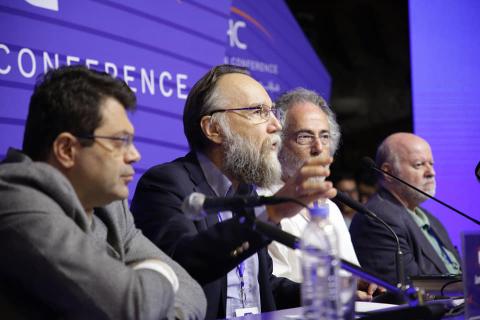Fourth political theory: the quest for Eurasianism
Primary tabs

The past is a Foreign country, these are the famous words of V.I Hartley but future is a quest; a quest for destiny, a quest for identity and a quest for order. History has always been ambiguous because facts are hard to establish, and reality is built on prejudices, misconception and ignorance of our perception and knowledge. When we talk about the twentieth century, it ended with the end of ideological conflict and marked the beginning of a new era in which ordinary masses began to define themselves in terms of culture and religion.
Similarly, the rise of the fourth political theory declared the end of twentieth century as the end of the epoch of modernity. This theory was put forward by Russian philosopher and political scientist Alexander Dugin. According to Dugin, though twentieth century has ended with tumultuous events shattering empires and civilizations but now, it is the beginning, we should realize it. For Dugin, twentieth century was an exceptional period of human history, because it reshaped the world map, civilizations and ethnic politics. The world went into a severe division alongside deep-rooted ideological rifts and civilizational diasporas. In this way, twentieth century marked itself as the beginning of a new time in human epoch and presented itself as the soul of modernity. But with its end, human beings began to experience a crisis of ideology and began freeing themselves from the epoch of peculiar leaps and bounds by marking the end of ideology.
According to Dugin, three ideologies were marked as the socio-political foundation of twentieth century; liberalism both left and right, communism together with Marxism and fascism alongside national socialism and national syndicalism. These ideologies went into catastrophic conflict and fought each other to death. Likewise, the world became empty and began suffering from the standpoint of binary opposites: ‘Being’ and ‘Other’ phenomenon. Therefore, people are now looking for a new political direction in the vacuum and the fourth political theory with an Eurasian vision is presenting a great opportunity to fight for collective identities.
According to Dugin, three ideologies were marked as the socio-political foundation of twentieth century; liberalism both left and right, communism together with Marxism and fascism alongside national socialism and national syndicalism. These ideologies went into catastrophic conflict and fought each other to death. Likewise, the world became empty and began suffering from the standpoint of binary opposites
The very first theory that came to dominate the global socio-political scene was liberalism, that emerged in the late Eighteenth century and became a beacon for eigenelement but with the beginning of Twentieth century, it scattered into different variations and died like communism. Likewise, the rise of communism together with Marxism, Socialism and social democracy emerged as a reaction to the bourgeois capitalist system. Communism lambasted liberalism as an ideology because, it was sheltering exploitative bourgeois capitalism. Finally, fascism began dominating global politics and emerged as a third political theory by calling itself as the essence of modernity. Thus, fascism together with national socialism and national syndicalism emerged as a reaction to both communism and liberalism but the fact can not be denied that it was the alliance between first political theory and second political theory during world war II, though a suicidal alliance defeated fascism.
According to Dugin, both liberalism, and post-liberalism severely failed to give a smooth direction to the world, despite the fact, it was not as dogmatic as communism but still failed to appease the masses ideologically. In the phenomenology of Hegel, it explains the mind of humans, which is embodied in his rules and institutions. Because in the building of civilizations, man creates ideologies, institutions and rules that are simultaneously his own products and are alien constraints upon him. The transition of mind from one stage to another is dialectical because it produces an oscillation between the claims of an individual and the demands of the society. For Hegel, the major triad in this transition of mind consists of ‘Subjective mind’, ‘Objective mind’ and ‘Absolute mind’.
According to Dugin, Human civilization has tested all of them; Subjective mind gave birth to liberalism, Objective mind gave birth to Marxism, while absolute mind gave birth to fascism in the pursuit of modernity. All these ideologies ended in failure and now, it’s time for the Fourth Political theory to rescue human civilization from decay. For Dugin, Russia is the only country in the Eurasian belt which is technologically, educationally and multiculturally superior than others, and thus can protect collective identities by giving birth to Eurasianism (Eurasian Union).
For Dugin, the reign of Vladimir Putin in Russia offers a great opportunity to the Eurasian communities to merge themselves into Eurasian Union in order to protect themselves from the civilizational decay. In this regard, Dugin suggests Putin to become Super-Putin (superman in Nietzschean context) to mend the broken ties in the Eurasian Region. What Dugin once famously said: “An important aspect of the Eurasian Worldview is an absolute denial of the western civilization because in the opinion of Eurasians, the west with its ideology of liberalism is an evil”. Thus, the only option left for Eurasians is to embrace the fourth political theory in order to free themselves from European cultural imperialism, which is based on liberalism.
